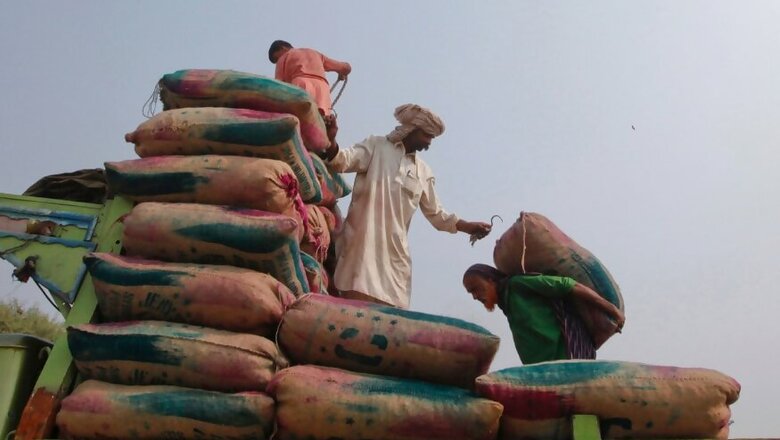
views
Srinagar: All was routine at the cross-Line of Control (LoC) trade centre on Thursday. A steady hum of engines could be heard over the general hustle bustle, as the trucks underwent thorough security check and unloaded their haul of goods in turns at the Chakan de Bagh in Poonch.
Laden with an assortment of spices, dry fruits, herbal medicines and other items, these trucks were supposed to skittle past the de-facto border and travel into the Pakistan side of Kashmir, the usual order of things, with the trucks from that side crossing over to India.
However, the litany came to an abrupt halt that day, after a sudden order from Ministry of Home Affairs (MHA) suspended trade with Pakistan across the LoC, which was started in 2008 as a confidence building measure between the two hostile neighbours to promote peace.
While suspending the trade—which takes places from Salamabad in Kashmir’s Baramulla district and Chakan-da-Bagh in Jammu’s Poonch district—the Home Ministry alleged that the route is being used for illegal trade of US-origin California almonds, pumping of fake currency, and the funding and promotion of terror groups and anti-India operations in the Valley.
The MHA, in its statement, also explained how the NIA has “decoded the modus-operandi of dubious hawala transactions for militancy financing.” The inimical elements on Pakistan side, it said, identify a suitable Pakistani trader firm and hand over the money to be transferred to the “anti-national elements and militant organisations” on the Indian side. “Pakistani trader under-invoice the products like California almonds to the extent of money received by him (sic),” the statement read.
The effects were immediate. Kashmiri businessman and president of LoC traders’ association, Zahoor Ahmed Watali, is already in NIA custody and is being probed for “funnelling money to militants, separatists and subversive elements in the Valley.” His property is attached by the Enforcement Directorate (ED).
The suspension order directly puts the jobs of thousands of traders in Kashmir in jeopardy. According to Hilal Turkie, the chairman of the Cross-LoC Trade Body, the trade volume in the past decade touched Rs 6,000 crore and has created 1.70 lakh job days, so far. “The services of 6,170 trucks and hundreds of labourers was rendered in trade. The move will directly affect their lives,” he said.
Pawan Gupta, who heads the traders’ body in Chakan-da-bagh, thinks that the hasty nature of the decision will prove to be catastrophic for traders. “We should have been informed at least 15 days ago. Goods are purchased at least a month before in both the countries and stocked,” he said. “We don’t have that a big market in our state where we can sell these goods,” he added.
Action should be taken, Gupta said, against the traders who are involved in malpractices, but not at the cost of the entire trading community. “The trade has been stopped briefly a number of times, but never like this,” he said.
Discontent brews on the other side of the border too, with Pakistani politician Mushahid Hussain, dubbing the cancellation of cross-LoC intra-Kashmiri trade as an unacceptable violation of the 2008 agreement. “This was one of the most important CBMs on Kashmir and was arrived at with the mutual consent of both India and Pakistan,” said Hussain, who is currently the senator from Islamabad and Chairman, Senate Foreign Affairs Committee.
“It’s motivation seems 3-fold: cut the connection between Kashmiri traders on either side of the LoC, for whom ‘Kashmir ki mandi, Rawalpindi’ was a key plus; break the bond of the Kashmiris in Indian side with their Pakistani brethren; appease the Hindutva BJP base in Jammu and Kashmir and India for petty electoral gains,” said Hussain. He finds the decision to be “heartless and short-sighted move”, one which will “deepen the divide”, and said that Pakistan rejects this move as “immoral, unjust, illegal and anti-people”.
Kanwal Sibal, the former Foreign Secretary to the Government of India, however, saw the entire endeavour to be pointless. “There is no point of having such trade at the time when ‘infiltration of militants’ doesn’t stop,” he said. “If the situation was totally peaceful on ground and things were in control, I would see some point,” he added.
According to the diplomat, trade in the region should not be “Kashmir-centric”, but an “integral part of a larger, broad-based trade package between India and Pakistan.”
“When there are restrictions even on trade across peaceful international borders, it doesn’t make sense having trade across an unstable violence-prone Line of Control,” said Sibal, who has served in over ten countries as a part of Indian diplomatic mission. “If the trade takes place through Wagha, then it is between India and Pakistan. Cross-LoC trade is only between the Kashmiris and that doesn’t make any sense,” he added, explaining how it goes against India’s international image since “it strengthens the notion of the entity called the people of Kashmir.”
In the words of Abdul Basit though, “It is all an Indian election gimmick." “This is the same trite mantra which India also invokes against talking to Pakistan,” said the retired Pakistani diplomat, who served as the former high commissioner to India said. “The fact is, India is a difficult neighbour which is hell-bent to make things increasingly cumbersome for all,” he added.
In Srinagar, the Peoples Democratic Party (PDP) and the Hurriyat denounced the Centre’s move. “When I was Chief Minister, there was pressure to wind up the trade but I resisted. Opening routes are only way to resolve the problem. Unfortunately, we are going backwards,” alleged PDP president Mehbooba Mufti.
Hurriyat chairman Mirwaiz Umar Farooq said, “Even whatever little had been achieved since the Vajpayee time, is being blocked and stopped. Such measures for short term gains come at a huge price for people.”
The move comes only two months after India withdrew the Most Favoured Nation (MFN) status to Pakistan, following the terror attack in Pulwama, which claimed the lives of at least 40 CRPF personnel.
















Comments
0 comment